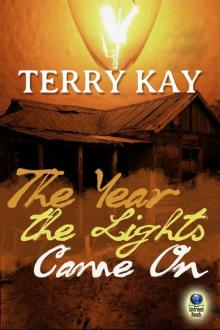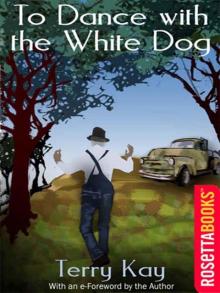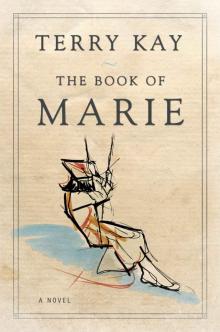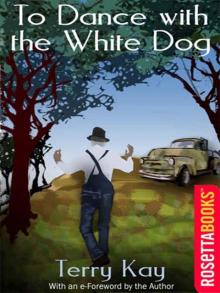To Dance With the White Dog Read online
Page 14
“They ain’t here.”
“Where are they?”
“Two of them’s working up in Virginia. The other’s in jail, but I guess you know about that.”
“How long they been in Virginia?”
“A week. Maybe more.”
James relaxed his hand. He walked to the porch, near Herman Morris. He said quietly, “Mr. Morris, you take a good look at me. There’s nothing on the face of this earth I love more than that old man. If anybody ever put a finger on him, they’d know what I mean. You tell your boys that. You tell them to ask Arlie about me. Now I’ve got two preacher brothers sitting out there in the car and I expect they’re scared to death right now, worrying about our souls. But they don’t know you; I do. And I don’t want them to. I want them to keep having faith. If you know anything about my daddy, you better tell me now.”
James could see confusion in Herman Morris’s face. He saw a man who was tired and old before his years to be old, and he felt a surge of pity for the man standing before him.
“I ain’t seen him, boy,” Herman Morris said softly. “Hope you find him, though. He’s a good man. Give me some trees one time, and some grapevines. Any of my boys ever bothered him, they’d have me to answer to.”
James slipped his pistol back into its holster. He knew Herman Morris was telling him the truth. The temper drained from him. He could feel his hand trembling.
“Sorry I upset you, Mr. Morris,” he said. “Coming up like that. He’s my daddy. And I don’t know where he is.”
Herman Morris nodded. He turned and went back into his house.
In the car, watching, Paul said to Sam, Jr., “I pray to God nobody’s hurt Daddy. If they have, I pray somebody gets to them before James.”
“I know,” Sam, Jr. said. “But let’s not say anything to him. Not now.”
“Don’t worry. I won’t,” Paul whispered.
“I don’t think anybody’s hurt him. I think he got lost. What I’m worried about is how cold it is tonight. The cold hurts his hip.”
“I hope he had his pills,” Paul said.
“He did. Alma said she checked. Said they were gone.”
“And he’s got the dog.”
“Yes, he’s got the dog.”
His legs were cramped in the seat of the truck cab, and when he moved them spurts of pain stabbed through his hip, causing him to cry out softly. A wind blew briskly from the northwest, low to the ground, skimming over the field below the tenant farmhouse and swirling around his truck. The wind seeped into the truck, into the quilt and the clothing covering him, and he could feel it clamping to his skin. He could not remember being so cold. He put his head against the cushion that he used to sit on when he drove and he tried to sleep. When he did—lightly, fitfully—he dreamed of Cora.
They were walking across a meadow toward a distant stand of pines and, near it, a wide stream that curled through the farm owned by Madison A&M. It was his favorite place on the farm, and he had promised to take her there. The day was bright, clear, green, with the sweet aroma of grasses and wildflowers swimming against their faces.
“Somebody might see us going down there,” she said tentatively.
“Let them,” he replied confidently. “See if I care.”
“There’s rules—”
“What’re we doing?” he demanded. “We just walking. Nothing wrong with that.”
“I just wonder what people would think, seeing us going off in the woods.”
“Well, I don’t care. I’m just showing you the farm, like I would anybody that wanted to see it. Everybody ought to see the farm.”
“You could get fired,” she cautioned.
He laughed. “They’re not going to fire me. Be hard for them to find somebody else that’d do what they got me doing.”
“If they do, don’t say I didn’t warn you.”
“I won’t.”
They crossed the meadow and walked along the sandy rim of the pine tree stand until they could no longer see the buildings of the school, and then he stepped into the woods. She followed him hesitantly.
“Come on,” he urged. “It’s not as hot in here. Besides, it’s like walking on a pillow.”
He was right. The lush brown covering of fallen needles was a cushion for the step, and under the umbrella of towering limbs above them, the air was surprisingly cool.
“You like it here?” he asked.
“Yes,” she said.
“First day I was at this school, I came down here,” he told her. “There’s a hickory tree down by the creek. I went down there and got a leaf off it and chewed on it, and I was all right.”
She looked at him with a strange, questioning expression. “You ate a leaf?”
“Uh-huh. Sure did. Well, to tell the truth, I just bit it. I like trees. You take a bite out of a leaf, you know if it’s good wood or not.”
“How?”
He smiled shyly. “It’s a secret.”
“I don’t believe you.”
“It’s true,” he vowed. “But you got to like trees. I’d rather be with trees than most people I know. Someday I’m going to have me a tree nursery. That’s what I’m going to do. Grow trees.”
They strolled through the pines, talking. He knew he was bragging, like Marshall Harris bragged, but he enjoyed telling her about himself.
“Listen,” he said.
“What?”
“The creek.” She heard it. The gurgling of water near them.
“There’s a lot of moss down near the creek. It’s all over the place,” he said. “Smells good.”
She lifted her face and inhaled slowly. “Yes. It’s musty.”
“I like it,” he said, smiling. “Sometimes I come down here just to smell it. Reminds me of when I was little and used to go fishing down on a creek near where my brother lived.”
“Let’s go see it,” she said.
They sat on the creek bank, above an outcropping of granite that rippled like a gray muscle across the creek and into the opposite bank, and she leaned against his shoulder, silently watching the white spew of water spinning over the flat granite shoals.
“Like it?” he asked.
She nodded.
“Cora?”
“Yes.”
“I want to marry you.” He said the words easily, surprising himself.
She did not answer, but her head moved against his shoulder.
“How many children do you want?” he asked bravely.
“I don’t know,” she said.
“I want a lot. I want them all over the place.”
“Why?”
“Just do. Always wanted a big family.”
“Yes,” she said.
“Yes, what?”
“Yes, I’ll marry you.”
In his dream, he saw her face that day. Her eyes were like light through translucent gemstones of hazel and brown. Her eyes were looking into him, asking questions.
“What’s the matter?” he asked.
She blinked and a moist film covered the gemstones and he saw nothing but gladness. “Nothing,” she answered softly.
* * *
He awoke with a shudder of pain. He could hear the wind whistling around the truck, and he could feel the cold biting into him. Beside him, curled on the floorboard of the truck, the white dog whimpered and rose and moved close to him, nudging her face against his chest. He looked at the dog, into the dog’s eyes, and he saw Cora’s eyes, the gemstones of hazel and brown. With a cry he pulled the dog to him and held to her.
20
The tapping above his head woke him, and in the wakening moment, in the murky semi-consciousness of that moment, he did not know where he was or what was happening around him. His body ached, and the pain in his hip caused him to swallow hard for breath. He was still cold. He heard the tapping again.
“Mister?”
The voice was loud, and the tapping on the window became a knocking. He caught the steering wheel and pulled himself up and looked thr
ough the window. The pain in his hip exploded in his brain and he felt faint.
“You all right, Mister?”
He bowed his head to fight the pain.
“Can you roll down the window, Mister?”
He sat, breathing in quick, shallow sips of air. Then his breathing eased, and he looked up at the man beside his truck. The man had the dried, lined face of a farm worker. He wore a bill cap with an insignia of a bulldozer. His denim jacket was buttoned tight against his throat.
“Can you roll down the window a little bit?” the man said again.
He turned the handle and rolled the window down halfway, and the man looked into the truck suspiciously.
“You look sick,” the man said. “How’d you get out here?”
“Don’t know,” he admitted. “Got turned around. Got myself lost.”
“My boy saw the truck up here earlier this morning. Said he looked in it. Said he thought they was a dead man in it. He come to get me.” The man gestured with his head. “He’s parked over there.”
He looked in the direction the man gestured and saw a car. A young man, dressed like his father, stood behind the opened door of the car, as though shielding himself.
“You must be half-froze,” the man said. “It got down close to frost last night.”
He nodded. The cold and the pain from his hip had made him nauseous.
“Need to get out and stretch some?” the man asked.
“I guess,” he said.
The man opened the door and held it.
He pulled himself to the edge of the door and placed his left foot on the running board of the truck. “Mind handing me that walker in the back?” he asked the man. “Can’t get about without it.”
“Yes sir,” the man said. He took the walker from the bed of the truck and placed it on the ground and held it. “Take your time.”
He stood with his weight on his good leg and with his hands pressed on the walker, his arms locked straight, and he tried to move his bad leg. He could feel blood pumping hard in his throat and arms.
“Need some help?” the man asked.
He shook his head. “Been cramped up all night. It’ll take a minute.”
“My mama had a bad hip,” the man said. “She used one of them things. I know how it is.”
He thought he heard his dog whimper behind him and he said, “If you step back a little bit, I’ll get my dog out.”
The man smiled quizzically. “What dog you talking about?”
He turned and looked back into the truck. White Dog was not there. “My dog was with me last night,” he said firmly. He scanned the yard of the tenant farm house. “I must of let her out,” he mumbled, but he did not remember.
“I’ll have my boy look for her,” the man said. “What’s she look like?”
“White. Solid white,” he said.
The man looked quickly at his son and nodded once. His son looked away. “May be what my boy saw this morning,” the man said. “Told me he was driving on the road when he saw something white jump up in the fields. Thought it was a deer at first.”
“White Dog,” he said. “My dog. Your boy won’t find her. She’s skittish. Won’t have nothing to do with nobody but me. She was a stray that took up when I started giving her some scraps.”
“Stray dogs is like that sometimes,” the man said. Then: “My name’s Howard Cook. I live down the road, about a mile from here. Used to live here, in this place, when I was little.”
He extended his hand to Howard Cook. He said, “Sam Peek.”
“Where you from, Mr. Peek?”
“Over in Hart County.”
“You a long way from home,” Howard Cook said. “What brings you over this way?”
“Going over to Madison,” he said. “Started out yesterday morning, but I guess I missed a road somewhere.”
“Guess you must have missed more’n one if you still on the way,” Howard Cook said. “Why don’t you let me drive you down to my house and get you some coffee and something to eat.”
“Much obliged,” he said, “but no need of that. You show me how to get back on the right road, and I’ll stop off someplace.”
“Nothing around here to stop at,” Howard Cook said easily. “We kind of off the beaten path, and I’d feel a lot better about it if you’d let me drive you back down to my place. I do some preaching on Sunday at a little church not far from here. Preached about the Good Samaritan last week. Got to practice what I preach.”
“I got two boys that preach,” he said.
“Well, there, the Lord’s got His hand in this,” Howard Cook said. “I bet them boys has been praying for you, and the Lord’s done delivered you to me.” A smile eased into his farm-worker face. “I guess you’d want them boys of yours to be doing the same thing if they was in my place.”
Howard Cook, weekday farmer and Sunday preacher, lived with his wife, Mildred, and his son, Kenneth, in a large, once-grand house. “She sags a little bit,” Howard explained to Sam Peek, “but ever since I was a little boy I wanted to live in this house. Used to be the prettiest place around, when Coy Mize and his folks owned it. They used to own about everything around here, but the children all left and when Coy and his wife died, they just sold everything off. When I got out of the Army I was able to get it for a fair price. Needs some work, but it beats that old house where you spent the night.”
He was sitting at the kitchen table in Howard Cook’s home, nibbling at the generous breakfast before him. He was hungry, but he could no longer swallow easily, and he now ate in small bites, softening the food until it was comfortable in his throat. He had taken his pills, and the pain in his hip had eased. He felt surprisingly alert with so little sleep from his night in the truck.
“You want some more coffee, Mr. Peek?” Mildred Cook asked.
He shook his head, swallowed, and said, “Got enough, thank you.”
“You looking a lot better than you was a while ago,” Howard said. “Got you some color in your face.”
“Feel better than I did,” he admitted. “Food’s good, real good. Guess them sandwiches I had yesterday didn’t do much for me.”
“A person needs hot food,” Mildred Cook declared cheerfully. “Don’t know how a person gets by on nothing but sandwiches and that kind of stuff.”
“What time you say you needed to be in Madison, Mr. Peek?” Howard asked.
“Before lunch,” he said. “But I won’t be eating much when I get there, not with all this food.”
“Well, now, you’ll have some time to get a little rest before you start out,” Howard said. “You not that far away. Fifteen miles or so. We just out of Greensboro.”
“I don’t drive fast,” he said.
“Don’t need to,” Howard replied. “Your truck’s in pretty good shape from what I can tell, but it ain’t ready for no race. Gears seem to be a little loose on it. Guess you better have that looked after when you get home.”
He nodded and sipped from his coffee. He thought of Hoyt’s warning. Hoyt would be annoyed to know the gears were loose.
“Tell you what,” Howard continued, “I was planning to go over to Madison myself today. I can go on in this morning, and you can follow along.” He looked at his wife and saw the bewildered question in her face. “Mildred was saying last night I ought to go on over this morning and get it over with.”
“Yes,” Mildred Cook said quickly, understanding her husband. “Never did like to put things off. If you got something to do, do it.”
“Don’t want to put you out more’n I have,” he said.
“Now, Mr. Peek, would them boys of yours feel put out?” asked Howard.
After breakfast, he was led by Mildred Cook to a large, cushioned armchair with an ottoman and though he had protested mildly that he did not need rest, he was asleep within minutes.
In the kitchen, Howard sat at the table with a road map spread before him. “Best I can figure it,” he said to his wife, “he was trying to dodge the main roads
. He was talking about Comer and Lexington. Looks like he turned off at Bowman and went down to Comer and then over to Lexington, then maybe down toward Washington and on down to Sharon and over to Crawfordville, then back up twenty-two to where it runs into forty-four. Guess he must of took a left there, unless he got on one of them sideroads that cuts through. One thing for sure, he got lost out of Union Point. Had to.”
“How’d he get so turned around?” his wife asked. She was washing the breakfast dishes.
Howard laughed quietly, gently. “He showed me his map. It must have come out of the Forties. Had him a line marked on it. Looked like it was crayon. Guess he don’t see too good. Part of where he had marked was the Broad River, right down the middle of it. Thank the Lord he missed that turn.”
Mildred Cook smiled. “He’s a nice old man,” she said. “You can tell. Looks like he’s a little scared. You ought to call his folks.”
Howard folded his map. “I was thinking about it,” he admitted. “But I don’t know. Don’t like meddling in a man’s life. Don’t mind helping a man out, but they ain’t no need to meddle.”
“Maybe they’re worried about him.”
“He didn’t let on they would be. Said they knew he was gon’ be away for a couple of days.”
“Why’s he going to Madison?”
“Said he went to school there. Said they was a reunion.”
“He say anything about his wife?”
“Didn’t say and I didn’t ask. I’d guess she was dead. All he said was he had a couple of boys who were preachers. Seemed more worried about his dog than he did anything else. Wadn’t easy about leaving the old place, but he said she’d follow the truck. I didn’t see nothing.”
“She must be hiding out around the barn if she did,” Mildred Cook said. “I haven’t seen the first sign of a dog. You’d think our dogs would be barking their heads off if another dog was around.”
Howard shook his head. “Don’t know. Kenneth said he guessed what he saw might’ve been a dog. Said he never saw one that white.” He chuckled. “Told me it scared him. Said he could feel something watching him driving down the road, and when he looked out the window, he saw something white. Said he almost drove in the gully.”

 The Year the Lights Came On
The Year the Lights Came On To Dance With the White Dog
To Dance With the White Dog The Book of Marie
The Book of Marie After Eli
After Eli To Dance with the White Dog: A Novel of Life, Loss, Mystery and Hope (RosettaBooks into Film)
To Dance with the White Dog: A Novel of Life, Loss, Mystery and Hope (RosettaBooks into Film)